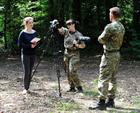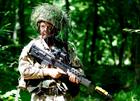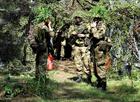Training for War, Junglie style
Ms Elise Tarr has recently completed a placement with the Commando Helicopter Force to gain an insight into the RN media organisation and to interview and report on the work of CHF. She is undergraduate at Kingston Universityand is currently studying Media and Cultural Studies. This is her report from CHF.
Royal Navy personnel from Commando Helicopter Force (CHF) based at RNAS Yeovilton are completing their fifth and final week military training or AIR 338 military acquaint course as it is known.
The course is designed to equip naval personnel with essential military field craft and infantry skills to survive alongside ground troops around the world and to be able to operate and fight effectively as a maritime expeditionary aviation force. Every member of the CHF, excluding Royal marines, has to undertake this intensive five-week course.
During the initial 3 week phase the trainees focus on learning various skills including basic field craft techniques, such as cooking rations, and learning how to utilise their SA80 weapons to the highest military standard. During this period personnel also receive theoretical and practical training in battlefield first aid, survival techniques, operational law, equipment care, navigation and surviving and operating in a chemical or biological threat zone, they also develop their personal fitness and expand their knowledge of their new Unit – CHF.
The fourth week combines all the skills learnt into a tactical field exercise and the fifth week will see Sea King helicopters added to the mix so that personnel can practise the skills to become a Junglie – failure will result in the students having to re-train or being withdrawn from the CHF cadre.
Fifth week scenarios carried out in the depth of Langport Range Training Areas include casualty extraction drills, mine strikes and aviation operations within a simulated Forward Operating Base. During their drills personnel will practice the iconic Arctic huddle under the downdraft of the mighty green giant that is the Sea King helicopter and will also learn aircraft embarking and disembarking technique, essential when making rapid movement in Operational scenarios.
Sergeant Nick Bachelor an air crewmen with 845 Naval Air Squadron, explained how, “The huddle provides the Pilot of the aircraft a visual reference that is impossible to have in environments such as the desert and the arctic where there are no trees or prominent features to aide the pilot or aircrewman.”
It is the experience of the Royal Marine specialist instructors from CHF that equip personnel with the relevant and imperative field skills to operate safely in the land environment. Lieutenant Gareth Plunkett, who is responsible for military training described how, “One of the benefits of the course is that it brings many different trades and elements together from around the navy. It includes everyone from trainee pilots and air crewmen through to signallers, chefs, stewards and logistics personnel. Individuals could have been employed in a frigate or destroyer prior to joining CHF so it is a real shock to the system when they have to learn how to rapidly adapt to survive and operate in the field. To achieve this we have to provide high quality professional training and through life personal development. Training ensures safety, efficiency and ultimately operational success which has been demonstrated in the Falklands War, the Former Yugoslavia, Iraq and Afghanistan.”
The training at Langport is tough and puts personnel out of their comfort zone, especially in recent temperatures that have exceeded 30 degrees centigrade. However it is an effective way to prepare them for even more challenging conditions, such as the arctic cold weather survival course in northern Norway and frequent environmental training courses in such diverse places such as Arizona and Jordan.
For Petty Officer Air Engineering Technician Brian Lilley, it is the second time that he has undergone this course. Soon to be joining the front line on 845 Squadron he explained how despite the course being tough, “It progresses naturally and has never been at an excessive tempo. But you are always thinking about the next objective as your comrade’s life could be dependant on you making the right decision.” He always reminds himself that “In a situation where you might be really fatigued usually the person you’re helping is in a worse situation than you are. You will recover, they might not.”
Logistician Michelle King, will soon be part of CHF’s logistics department once her training is successfully completed. The fourth week was her favourite as she put all her field skills together in a tactical environment. “It was emotional to start with but by the end of the week a lot was achieved. I now know how to go on patrol and take command of small groups; it was fun and a great experience.”
It is the success of the Air 338 military acquaint course and the dedicated personnel involved with administrating the course that ensures Commando Helicopter Force are ready for all eventualities be it on exercise or at war.








